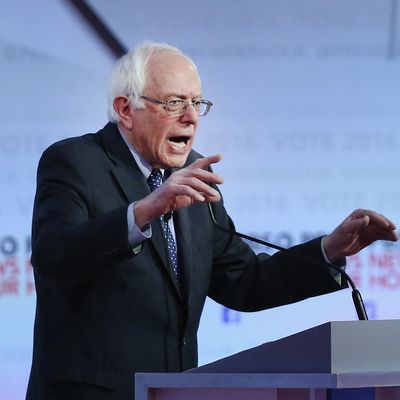
The benefit of Bernie Sanders’s presidential campaign is, or at least should be, that it’s broadening the horizons of liberal ambition. But the most recent debate within the primary has inverted the usual dynamic. Hillary Clinton favors a more ambitious (but politically riskier) proposal in Philadelphia, which would raise taxes on sugary drinks to finance prekindergarten education. And Sanders is the one opposing it on the grounds that the tax would disproportionately hit the poor. “It is a totally regressive tax,” Sanders said this weekend. “Somebody’s making $20,000 a year and they buy a bottle of soda, I don’t think you charge them $0.30 more for that bottle of soda.” It may sound as though Sanders is making a more progressive argument, but the case he is making subverts liberal ambitions, including his own.
The largest single impediment to the kind of welfare state most liberals favor is finding ways to pay for it. There’s more money to be raised by taxing only the rich, but not enough to finance the kind of social benefits American liberals would prefer. The most generous tax-and-transfer systems in the world — such as in Denmark, a country Sanders has cited as a model — do not tax the rich all that much more heavily than the United States does. The main difference is that they also tax the middle class heavily, and redistribute the proceeds further down the income scale.
Why don’t Democrats propose to raise middle-class taxes up to Scandinavian levels? The reason is simple: public opinion. Most Americans support raising taxes on the rich, but consider their own taxes too high. Their association with higher taxes on the middle class hurt Walter Mondale in 1984 and Michael Dukakis in 1988, and allowed Republicans to pose as champions of the middle-class pocketbook. For a quarter-century — since Bill Clinton’s 1992 presidential campaign — Democrats have worked around this weakness by steadfastly avoiding middle-class tax hikes. Clinton and Barack Obama both ran for president promising (and delivering) tax cuts for working families, while increasing taxes on those earning more than about a quarter-million dollars a year.
Democrats have managed to hold the political high ground, and instead forced Republicans to defend unpopular plans to slash taxes for the rich. But, as noted above, this has come at the cost of constricting the scope of what Democrats can pay for. The old joke about socialism is that, sooner or later, you run out of other peoples’ money. The joke is partly true.
Sanders has upended this calculus by openly making the case that the United States should follow the model of high-tax Nordic social democracies. He has received justifiable credit for breaking the taboo on middle-class taxation and asking just why it is that Americans must be denied public services taken for granted elsewhere. On the other hand, because Clinton (who sympathizes with his goals) has largely held back from attacking him, the political risk Sanders’s program would bring has received little scrutiny.
But the vulnerabilities his proposals would face, if exposed to the full force of a general-election attack, would be massive. As Jonathan Cohn has written, Sanders’s proposal to finance his single-payer health-care plan would raise taxes on low-income families by raising the payroll taxes. (A single mother of two earning $26,000 a year and currently enrolled on Medicaid would pay some $1,600 more in taxes.) A Vox survey found that even supporters of Bernie Sanders are only personally willing to pay about $1,000 a year in additional taxes — far less than the $6,000 a year per family his health-care plan would cost.
One can agree or disagree on the merits of Sanders’s willingness to risk flouting public opinion. But where does this leave his opposition to the soda tax? His position is strange and ironic because taxes on specifically defined, unhealthy goods has long been the loophole through which Democrats escape the pressure of their own no-taxes-on-the-middle-class vise. Democrats have supported higher cigarette taxes to finance things like children’s health insurance — and voters have mostly treated this as consistent with their promise not to tax the middle class, even though the burden of such taxes is regressive. A tax on sugary drinks is an extension of the same strategy. Whatever the merits of Michael Bloomberg’s rather draconian ban on large-size sugary drinks, the fact remains that consuming hundreds of calories in a water substitute that does not fill you up at all is wildly unhealthy. It is a perfectly sound thing to tax from the standpoint of public health.
Sanders may be correct that the burdens of the tax fall disproportionately on people of modest means, but as Margot Sanger-Katz has pointed out, there is some evidence that this very feature can make the tax more equitable. By raising the price of sugary drinks, poor consumers can be encouraged to drink less of it, reaping the caloric rewards, while more affluent consumers pay the tax. What’s more, the proceeds of the soda tax finance a vital liberal social goal (in this case, early education). Sanders has no rationale to oppose the Philadelphia plan based on analyzing how only half of the program would work.
Indeed, it is very hard to understand how Sanders’s opposition to it can be reconciled with his own platform, which — both in its specifics and its general theme — rests upon higher taxes on the non-rich. To oppose a new tax-and-transfer plan based solely on the regressive character of the financing source, without any consideration of the benefits of the spending, would rule out his own plans as well. Not incidentally, Sanders has won plaudits from right-wing pundits at places like the Daily Caller and Reason, and a fake grassroots organization financed by the soda industry.
The Sanders campaign began as a message vehicle for his ideas. The final stages of the candidacy have brought him to a very strange intellectual place.






























